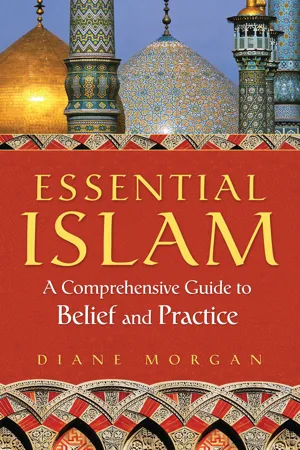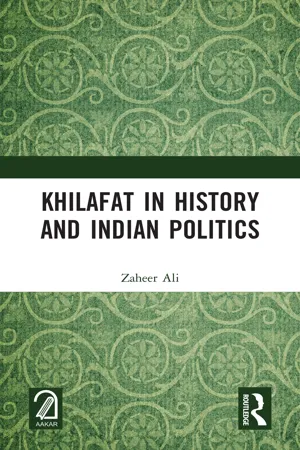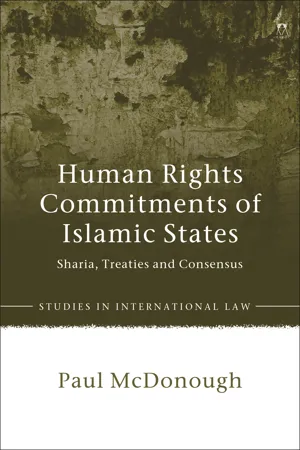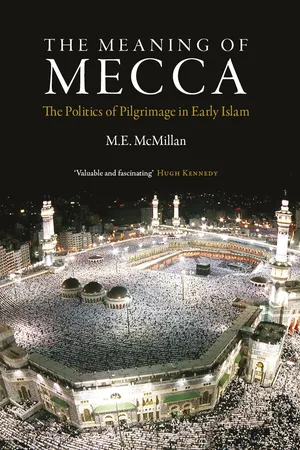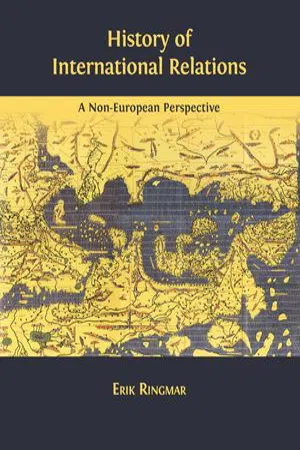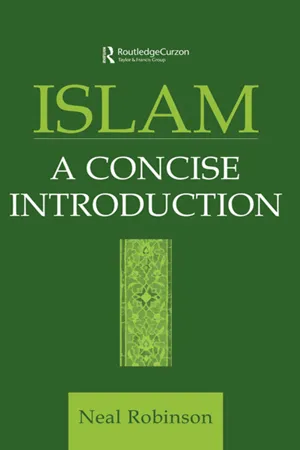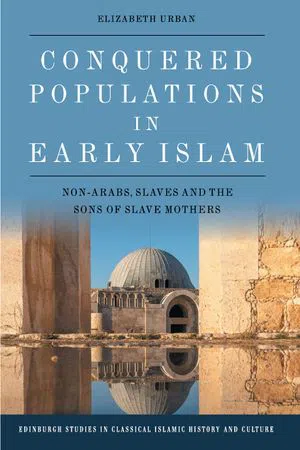History
Abu Bakr
Abu Bakr was a close companion and father-in-law of the Prophet Muhammad, and the first caliph (successor) of the Islamic community after Muhammad's death. He played a crucial role in unifying the Arabian Peninsula under Islam and expanding the Islamic state. Abu Bakr's leadership and contributions to early Islamic history are highly regarded, and he is considered a key figure in the development of the Islamic faith.
Written by Perlego with AI-assistance
Related key terms
1 of 5
8 Key excerpts on "Abu Bakr"
- eBook - PDF
Essential Islam
A Comprehensive Guide to Belief and Practice
- Diane Morgan(Author)
- 2009(Publication Date)
- Praeger(Publisher)
Abu Bakr had been with Muhammad for many years; he was also the man whom Muhammad had appointed to lead the Friday prayers in his absence. In addition, he had the support of Aishah, who distrusted Ali and who, naturally, preferred Abu Bakr, her own father. Three days after the death of the Prophet, Abu Bakr was elected as his successor. Muhammad had said of his conversion, “I have not invited anyone to Islam who did not exhibit some hesitation except Abu Bakr. He alone did not tarry when I mentioned it to him, nor did he hesitate.” However, although it was Arabic practice to select an elder to lead the “tribe,” the choice of Abu Bakr was presented in a preemptory man- ner that went against old tribal custom. The seeds of resentment were sown, but the bloody harvest would not be reaped for several years. The First Caliph: Abu Bakr (632–634) Abu Bakr was a trusting and gentle soul, who continued his profes- sion of selling cloth at the marketplace even after he became caliph, seeing no reason why he should not. He kept the entire treasury of the emerging kingdom in an unlocked box in his house and spent half the night praying to Allah. As caliph he was known as As-Siddiq ( Wit- ness to the Truth) and Amirul Muminim ( Ruler of the Believers). Abu Bakr also drew up the rules of fair warfare engagement, following the practice of Muhammad. Force was to be used only as a last resort— negotiation was infinitely preferred. Churches and synagogues were Muhammad 141 not to be touched, and monks and priests were not to be harmed un- less they were actively in revolt against Islam. On the negative side, Abu Bakr got into the habit of collecting a salary and using zakat for his own private purposes, clearly in contra- diction to what Muhammad wished. During his short reign he seemed somewhat oblivious to the military exploits of his generals, conducted largely against rebellious Bedouin tribes, and probably was not even aware of how fast his empire was growing. - eBook - ePub
- Zaheer Ali(Author)
- 2023(Publication Date)
- Routledge(Publisher)
ummah. The Shias criticism of Abu Bakr’s nomination rests on two points. First, instead of making arrangements for the funeral of the Prophet the two senior companions, Abu Bakr and Umar, got busy in politicking and ensuring the protection of their own interests. Their actions smack of political ambitions and an intense craving for earthly power, Two, the Muslims in general and Abu Bakr and Umar in particular, had conveniently ignored the wish of the Prophet announced publicly at Ghadir Khumm that for all those who thought of him as their protector and guardian, Ali would be their protector and guardian after his death. For someone who intends to sit in judgment without bias it would be a tough task to disagree with the Shia arguments.Considering Abu Bakr’s seniority and his long and selfless association with the Prophet his choice as the first Caliph was not altogether askew. He was a conscientious and kind-hearted man who would always empathize with the destitute and the weak and would leave no stone unturned to help them. He apportioned his fortune for two things—one, to support the needy members of the ummah and two, to donate for the cause of Islam. It is reported that once when the funds were needed for the protection of Medina, Abu Bakr placed all his wealth before the Prophet and when the Messenger of God inquired whether he left anything for himself and his family Abu Bakr replied, “Allah and His Prophet.”After his nomination, Abu Bakr addressed the Muslims in these words: “Behold me charged with the cares of the government. I am not the best among you; I need all your advice and your help. If I do well, support me; if I mistake counsel me. To tell you truth to a person commissioned to rule is faithful allegiance; to conceal it is treason. In my sight, the powerful and the weak are alike; and to both I wish to render justice. As I obey God and His Prophet, obey me; if I neglect the laws of God and the Prophet, I have no more right to your obedience.”19During his short term of Caliphate, Abu Bakr proved to be a laudable administrator and protector of the faith. The first arduous task Abu Bakr had to face on assuming the charge of the Caliphate was to deal with the rebellion and intimidating designs of various tribes that had threatened the very existence of Islam. In conformity with the pre-Islamic tradition, various tribes, on hearing the news of the death of the Prophet, refused to pay taxes (zakat) claiming that they were obliged to abide by the terms of the alliance only during the lifetime of the Prophet; with the death of Muhammad the alliance too came to an end and, therefore, they had no obligation to pay taxes. Besides, since they were till recently the idolaters and had flexible moral norms, they felt rather stifled because of the austere moral code of Islam. The escape route was shown by some shrewd and unscrupulous individuals who declared that they were the ‘prophets’ themselves. The most well-known in Muslim accounts is the name of Musaylimah ibn Habib. He was the chief of a powerful and one of the largest tribes, Banu Hanifa, which helped him secure the solid support of his tribesmen for promoting the claim of his ‘prophet-hood’.20 - eBook - PDF
- Valerie Hansen, Ken Curtis(Authors)
- 2016(Publication Date)
- Cengage Learning EMEA(Publisher)
Others could be king, but the Abbasids had a unique claim to being caliph. This chapter will examine the history of Islam, from the first revelations received by Muhammad to the final collapse of the Abbasid empire in 1258. Muhammad (ca. 570–632) Believed by Muslims to be the last prophet who received God’s revela-tions directly from the angel Gabriel. The first leader of the Muslim community. FOCUS QUESTIONS ❯ Who was the prophet Muhammad, and what were his main teachings? ❯ Between Muhammad’s death in 632 and the founding of the Abbasid caliphate in 750, what were the different ways that the Islamic commu-nity chose the new caliph? ❯ Which economic, political, and social forces held the many peoples and territories of the Abbasid caliphate together? ❯ After the fragmentation of the Abbasid empire in 945, which cultural practices, technologies, and customs held Islamic believers in different regions together? The Origins of Islam and the First Caliphs, 610–750 M uhammad began to preach sometime around 613 and won a large following among the residents of the Arabian peninsula before his death in 632. The man who succeeded to the leadership of the Islamic religious community was called the caliph (KAY-lif), literally “successor.” The caliph exercised political authority because the Muslim religious community was also a state, complete with its own government and a powerful army that conquered many neighboring regions. The first four caliphs were chosen from different clans on the basis of their ties to Muhammad, but after 661 all the caliphs came from a single clan, or dynasty, the Umayyads, who governed until 750. Muhammad was born into a family of merchants sometime around 570 in Mecca, a trading community in the Arabian peninsula far from any major urban center. At the time of his birth, the two major powers of the Mediterranean world were the Byzantine empire (see Chapter 10) and the Sasanian empire of the Persians (see Chapter 6). - eBook - PDF
Human Rights Commitments of Islamic States
Sharia, Treaties and Consensus
- Paul McDonough(Author)
- 2021(Publication Date)
- Hart Publishing(Publisher)
An unwritten constitution began to develop, as for example Abu Bakr initiated the office of caliph based on an exchange of promises with the people; he and Umar applied the Prophet’s words and deeds as sources of law; Uthman agreed to treat their acts as setting binding precedents; administrative structures formed; and the polity absorbed new communities under explicit compacts. Islam became ensconced as the state religion, its expression found in the Quran and the Prophet’s sunna . The first political task facing Abu Bakr was to hold the community together. Some of the tribes that had accepted the Prophet as leader considered that their compact had been with him personally and ended upon his passing. Abu Bakr’s defeat of their rebellion, the ‘wars of ridda ’ (‘going out’ or ‘apostasy’), marked in Sunni tradition ‘a defining moment … preserving a unitary state, and cementing the identification of Islam with the Arabs’. 60 The caliphate quickly expanded, motivated both to spread the new religion and to gain revenues. Forces led by Amr ibn al-As and Khalid ibn al-Walid annihilated the army of the Byzantine governor of Palestine near Jerusalem in 634, ‘opening all of Palestine to the Muslims’. 61 Muslim armies took Damascus in 635 and Jerusalem in 636. Umar’s decision to allow the former rebels of the apostasy wars to rejoin the community facilitated further military victories in Iraq and the conquest of the Sasanian Empire by 642, a year that also saw Muslim armies conquer Egypt, including the Byzantine Empire’s second city, Alexandria. 62 As these conquests progressed, Muslim armies established garrison towns nearby but separate from local population centres, to keep the forces concentrated and for their easy administration, as well as to preserve them as Muslim communities. 63 Under Uthman, the caliphate consolidated control over Iran, subdued Cyprus and Rhodes, and continued its expansion along the North African coast and into the Caucasus. - eBook - ePub
The Meaning of Mecca
The Politics of Pilgrimage in Early Islam
- M. E. McMillam, M E McMillan(Authors)
- 2011(Publication Date)
- Saqi Books(Publisher)
ḥajj , however, allowed Abū Bakr to achieve the seemingly impossible goal of exercising a political authority that was firmly rooted in religion while not encroaching upon the sacred territory of Muḥammad’s prophecy.As well as the caliph, a number of men are cited by the sources as leading the ḥajj during Abū Bakr’s caliphate. All of them –‘Abd al-Raḥmān,46 ‘Attāb b. Asīd,47 ‘Umar b. al-Khaṭṭāb,48 and the caliph himself49 – hailed from the Prophet’s tribe of Quraysh and all but ‘Attāb were Companions of the Prophet and early converts to Islam. While ‘Attāb may have lacked the precedence of an early conversion,50 he could nevertheless claim a connection with the Prophet: Muḥammad made him governor of Mecca,51 an appointment Abū Bakr later confirmed.52 If ‘Attāb did lead the ḥajj in 11/633, his appointment may have owed much to practicality because, as governor of the Holy City, he was already in situ and could carry out the task with relative ease.As the sources cite a range of possible leaders for the ḥajj seasons of Abū Bakr’s caliphate, it is difficult to determine if these men were appointed to the task because of their personal merit; their relationship with the Prophet; their membership of the tribe of Quraysh; or a combination of all three.The Quraysh were certainly important to Abū Bakr – Madelung refers to his time in power as “the caliphate of Quraysh”53 – and this importance is evident in Abū Bakr’s military campaigns. He repeatedly appointed members of the pre-Islamic Meccan aristocracy (all Qurashī) to lead armies in the riddah campaigns and the early raids outside Arabia: members of two of the main clans in Quraysh, ‘Abd Shams and Makhzūm, led most of these armies.54 By contrast, only one of the early Muslims who sacrificed so much in the early days of the faith was given a prestigious military command during the riddah campaigns – Shuraḥbīl b. Ḥasanah – and not one of the Prophet’s early allies in Medina, the Anṣār , was given the chance to lead a Muslim army.55 - eBook - PDF
- Erik Ringmar(Author)
- 2019(Publication Date)
- Open Book Publishers(Publisher)
This, the sahabah believed, could best be achieved if their energies were directed towards external, non-Arab targets. Moreover, they were on a mission from God. The sahabah were the custodians of the revelation as given to Muhammad and their task was to spread the word and convert infidels to the new faith. The new leader of the community must consequently, many felt, combine the qualities which had characterized Muhammad — to be a religious leader but also a politician and military commander. In 632, it was the Prophet’s father-in-law, Abu Bakr, who best exemplified these qualities, and he was elected to be the first caliph of what later came to be known as the rashidun , or “rightly guided,” caliphate. During his short rule, 632–634, Abu Bakr consolidated Muslim control over the Arabian Peninsula, but he also attacked the southern parts of Iraq, occupied by the Persians, and the southern parts of Syria, occupied by the Byzantines. The term jihad , “holy war,” is often used to describe this military expansion, yet political control, not religious conversion, was its main objective. The expansion may best be explained not by a religious but by a military logic. Since the troops of the caliphate were paid by the spoils of war — by what they could lay their hands on in the lands they conquered — the army could only be maintained as long as it continued to be successful. “Raids” is consequently a better term for many of these engagements than “battles,” even if the raids eventually turned into permanent occupations. Thus when the advance of the Muslim forces throughout Europe was eventually halted at the Battle of Tours in 732, this was regarded as a major triumph by European observers but merely as a temporary setback by the Arabs themselves. They simply retreated in order to fight another day. Moreover, since their occupation in many cases was quite superficial, it was often easy enough for the local population to reassert their independence. - eBook - ePub
Islam
A Concise Introduction
- Neal Robinson(Author)
- 2013(Publication Date)
- Routledge(Publisher)
This last group were the forerunners of the Shia, literally ‘the Party’ – short for Shiat Ali, Ali's Party. After discussions Abu Bakr (632–4), an aged and revered Emigrant, who was the father of Muhammad's favourite wife Ayesha, was elected head of the Islamic community. Abu Bakr was styled Caliph (literally ‘deputy’ or ‘successor’) of the Messenger of God. He subdued the bedouin tribes who had renounced their allegiance to Muhammad after his death. He himself died in 634, but not before he had designated Umar (634–44), another Emigrant and long-standing friend of the Prophet, to succeed him. During Umar's reign the Muslims conquered large parts of the Byzantine Empire – including Syria, Palestine and Egypt – and overthrew the Persians. The two key battles were the defeat of the Byzantines at Yarmouk in 634 and the Persians at Qadisiya in 637. Umar's generals built garrison towns at Kufa and Basra, in Iraq, and Fustat (now part of Cairo) in Egypt, which functioned as bases for further military expeditions. When he was murdered in 644, the six men whom he had chosen to deal with the succession elected Uthman (644–56). Although Uthman was an Emigrant, he belonged not to the Hashim clan but to the Umayya. He proceeded to appoint members of his own clan as provincial governors and to bestow on them lands which had previously been the property of the state. This caused widespread dissatisfaction which led ultimately to his assassination in 656. Ali (656–61) was elected to succeed him but was unable to overcome the opposition of his rivals. In particular, Uthman's cousin Muawiya, the governor of Syria, blamed Ali for the assassination and refused to swear allegiance to him. Ali moved his capital from Medina to Kufa in Iraq and confronted Muawiya in battle at Siffin. The battle was indecisive and Ali decided to accept arbitration - Elizabeth Urban(Author)
- 2020(Publication Date)
- Edinburgh University Press(Publisher)
Here transpired two events that would occupy the attention of later scholars, up to the present day. First, he became embroiled in a legal dispute that strained his relationship with his half-brother Ziyād (d. 53/673). In this dispute, which will be analysed in more detail below, Ziyād caused Abū Bakra to be found guilty of slander, or falsely accusing someone of adultery ( qadhf ). Second, Abū Bakra refused to take part in the Battle of the Camel, one of the battles of the First Civil War that took place near Basra. He excused himself from aiding one of the leaders of this battle – the Prophet’s widow ʿ Ā’isha, who encouraged the troops from atop her armour-clad camel – by quoting the hadith: ‘Tose who entrust their afairs to a woman will never know prosperity.’ 5 While Abū Bakra unfortunately demurred in gender-specifc terms that have had a lasting impact on gender ideologies in the Islamic world, it was not only ʿ Ā’isha whom he refused to help in this confict. He repeatedly expressed a politically detached attitude and a desire for reconciliation between the warring factions. 6 As a vocal advocate for political neutrality, he never held any political ofce in the Umayyad government. 7 After living a fruitful life, fathering many children, and amassing a great estate in Basra, Abū Bakra died in the year 52/672. Transforming Arabian Society: Abū Bakra as ‘Freedman of God’ A basic methodological approach to the early Islamic historical sources is to search for traces that do not ft neatly into the main historical narrative and therefore are not likely ideological back-projections. Far from destroying scholars’ confdence in the historical narratives, such an against-the-grain reading confrms that our sources have not been altered beyond all recogni-tion. Reading between the lines of the historical sources in this way, the sources provide circumstantial evidence that Abū Bakra was not a mawlā of the Prophet Mu ª ammad, or even a mawlā at all.
Index pages curate the most relevant extracts from our library of academic textbooks. They’ve been created using an in-house natural language model (NLM), each adding context and meaning to key research topics.
